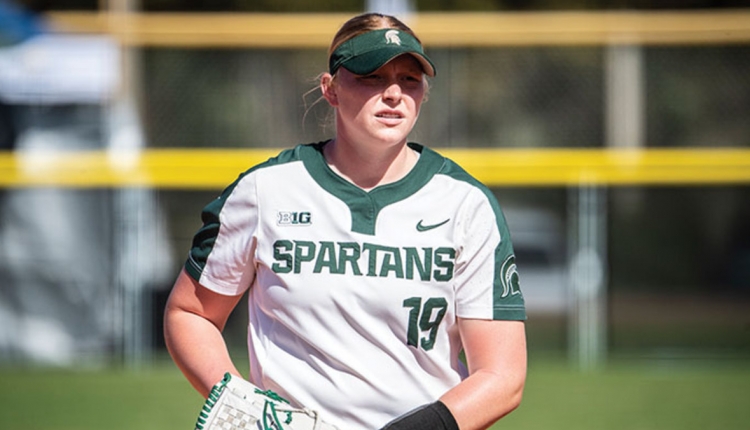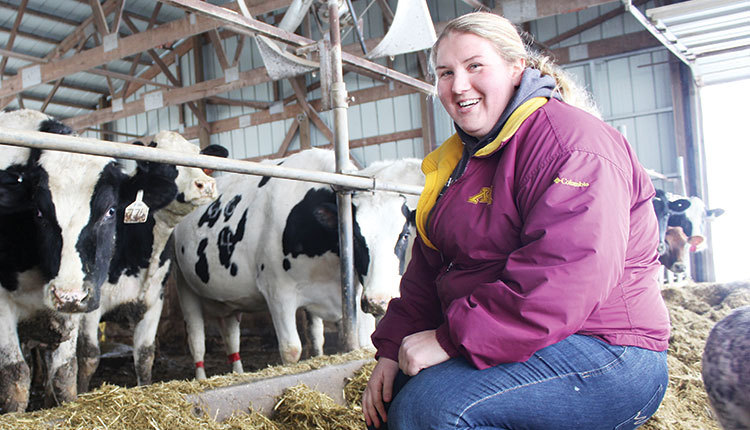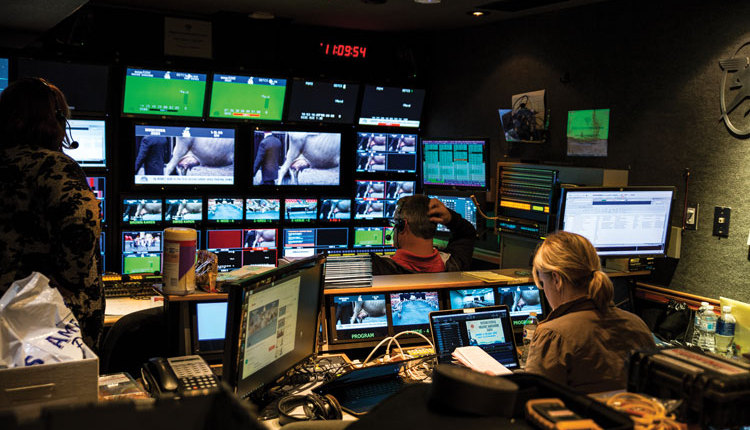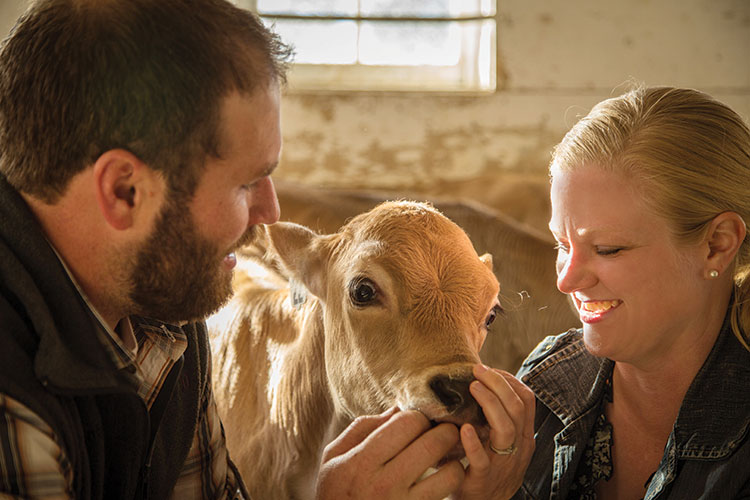
Since its purchase at a sheriff’s auction during the Great Depression, each generation left its mark on the Wegmueller Dairy Farm. The original building can still be seen in the peak of the barn roof. With time, facilities improved and the farm grew. In 2008, the family spoke of expanding their herd from 70 to 250 cows, building a freestall, and adding a parlor. A close examination of the industry showed that path would not work. The fourth generation, Dan and Ashley Wegmueller, decided it was time to cut back.
After extensive research and discussions with an agriculture lender, the Wegmueller milking herd dropped back to 50 cows. Their income was reduced, but so were expenses.
Dan said it was an easy decision.
His father, John, passed away unexpectedly in 2014. At the time, they were running over 700 acres of cropland and had livestock in three different locations.
“The norm in the industry is to always expand,” Dan said. “Instead of producing more in an already saturated market, I became interested in cutting costs and managing our overhead.”
Grazing cattle cut their feed consumption in half, and equipment ran less often than those with confined livestock. His cows performed better on natural footing, received more exercise, and had fewer reproductive issues. The Wegmuellers continued to provide a balanced ration with micronutrients and feed ingredients such as dry hay for fiber, high-moisture shell corn for energy, corn silage for palatability, and haylage for protein.
Overall, Dan maintains a loosely written feed plan. He utilizes what comes from each harvest. This flexible feed strategy proved smart this past summer, as poor weather kept farmers from the field and hay prices skyrocketed. Knowing milk and hay prices did not add up, the Wegmuellers simply took fewer cuttings of hay.
“I’m not worried about putting up super high-quality feed if milk isn’t worth anything,” Dan said. “That’s less fuel, less wear and tear on equipment, and less labor to hire. Rather than make up money on milk, I’m going to make it up by cutting costs.”
Dan’s business strategy stemmed from diverse experiences. He worked in Australia immediately after high school, which was where he first saw rotational grazing. Dan’s later residence in Switzerland opened his eyes to agritourism.
An open door
“It was nothing on my host farm for people to just randomly walk in and watch you milk cows,” Dan said.
Continuing down a nontraditional road, he studied business at the University of Wisconsin-Platteville and tropical marine ecology at The University of Queensland in Australia. While seemingly unrelated to agriculture, Dan said the two degrees helped him understand the fiscal bottom line and how actions above land impact everything downwind and downstream.
The overall farm plan results in average production with well-managed inputs. Milking a Brown Swiss herd helped the dairy farm obtain higher cheese-yield component premiums. In a previous generation, Dan’s father chose the breed to honor his Swiss heritage.
The farm experienced another blow in April of 2017. Dan’s mother, Becky, also passed unexpectedly. Now, Dan’s childhood farmhouse sat empty.
Dan and Ashley enjoyed living down the road and had to decide what to do with the farmhouse. Numerous options ran through their minds. Milk prices were slipping. The market for all livestock was dropping, and crops were losing their value.
As they cleared the house, Dan turned to Ashley with an idea. He proposed converting it into an Airbnb for a vacation rental experience.
Reflecting on the growing gap between consumer perceptions and reality in agriculture, Dan and Ashley realized there was a chance to benefit not just their farm, but everyone working in the industry. Positioned 2-1/2 hours from Chicago, one hour from Madison, and about two hours from Milwaukee, it was the ideal location to reach an urban audience.
“For all the criticism they receive, millennials are good at one thing in particular,” Dan said. “They tend to spend money on experiences rather than things.”
After John’s passing, Ashley left her teaching job to become more involved with the farm. The Wegmuellers gave the entire house a face-lift, removing styles from the 1970s that included pink-and-gold shag carpet and outdated trim colors.
“None of this would be possible without the two of us working together,” Dan said. “Ashley brings a lot of unique ideas and perceptions.”
Their style incorporated a Swiss-European look. Once completed, the house could fit 11 guests with four bedrooms, six beds, and two baths. Additionally, they converted the basement into a stand-alone apartment with full amenities.
Naturally, the Wegmuellers did everything up to code. Still, the concept of hosting guests on a farm stay has cost them greatly in insurance. Billing the property as a short-term vacation rental more than tripled their premiums, since guests will have the opportunity to interact with the animals and some equipment.
“A good idea always has a lot of consequences,” Dan said. “The whole point of all of this was not to do anything under the rug. The point was to shout from the mountaintop and invite people to come and see this.”
Dan admitted he was doubtful of their success. Agriculture prices were breakeven at best, and he was not sure how long they could hold on to this goal. Dan and Ashley openly admitted they went from April of 2018 until November without being able to pay bills. Fortunately, the Wegmuellers kept open communication with their suppliers, promising to repay their debts, even if it meant selling the farm.
“It was a really stressful year,” Dan said. “Unless you’ve gone through it, you will never know how it feels. The fact that nobody cut us off when they should have tells me there was a lot of community support for this.”
Eventually, the Wegmuellers did sell 90 acres to restructure debt and moved forward.
The opening of their agritourism business in September 2018 was quiet. They uploaded professional photos to the Airbnb website without advertisements or reviews. From that moment, they were booked almost every weekend through Thanksgiving.
“If I had a dollar for every time my picture was taken, I wouldn’t have to milk cows,” Dan joked.
Guests arrived from Chicago; Washington, D.C.; California; New York; New Jersey; Ecuador; Great Britain; and even Africa’s Rwanda. The Wegmuellers noticed two key demographics. One included parents who wanted their young kids to explore a farm. The other encompassed young, well-educated, and successful people.
“I think what it comes down to is that most people know they are being lied to and agriculture is misrepresented,” Dan said. “People want to come out and see it for themselves. They ask intelligent questions.”
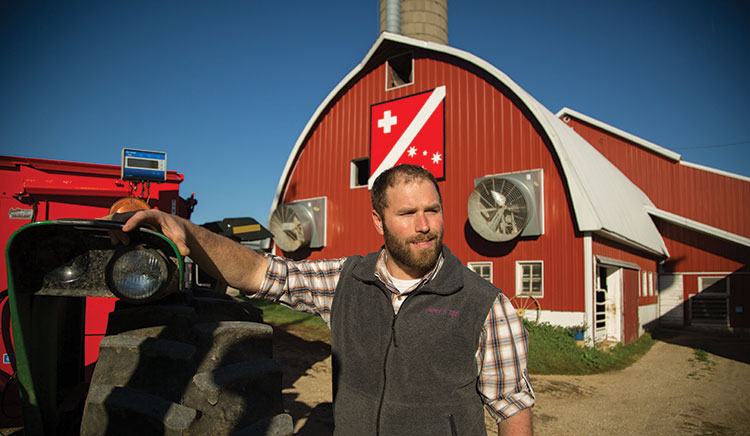
Transparency is the key policy
Dan and Ashley safely give their guests a farm experience from milking cows by hand to feeling the sensation of a milking unit on their fingers. Their goal is to create a human connection with consumers in an increasingly impersonal world.
“Our guests want to learn,” Ashley said. “They want to be involved. Almost every group has come out to meet the cows, feed the calves, or see the milking.”
Eventually, Ashley took an additional, full-time job off the farm in marketing. As the couple became increasingly busier, they decided to bring a younger generation into the dairy. After speaking with Blackhawk Technical College in Monroe, Wegmueller Dairy developed a paid internship program.
“One of the biggest problems in agriculture right now is that a lot of people want to get into farming, but they have no way to get in with the costs of land, buildings, and machinery,” Dan said.
The Wegmuellers hired two young women with no farming experience. Within two weeks, the interns were completing daily chores that included milking cows, assisting newborn calves, and operating machinery.
Leaving their mark
While the peak of the original barn still stands proudly at the Wegmueller farm, the agricultural landscape surrounding the building will never be the same.
Dan and Ashley promise to grow the farm experience. Dan is no stranger to media, and he has provided radio broadcasts for 10 years and is published frequently. He hopes to use these connections and communication skills for additional outreach about their new venture and agriculture as a whole.
“We want to draw attention to what we are doing here to not only give a voice to agriculture but also keep this operation relevant for another generation,” Dan said. “This is how we are going to transition into the future.”
Together, the Wegmuellers built a niche foundation to expand interest in agriculture and maintain their stay in the industry.









